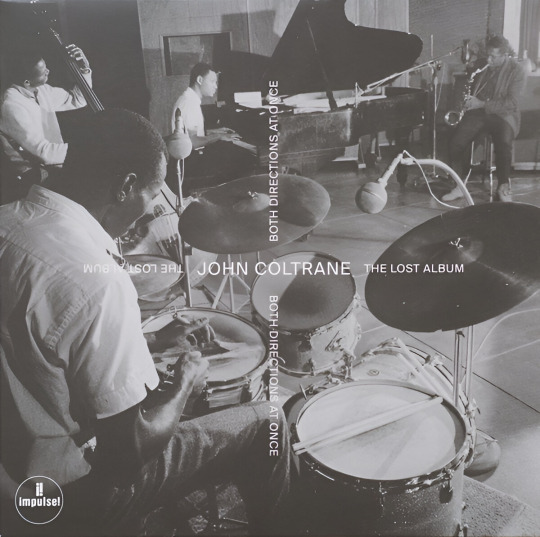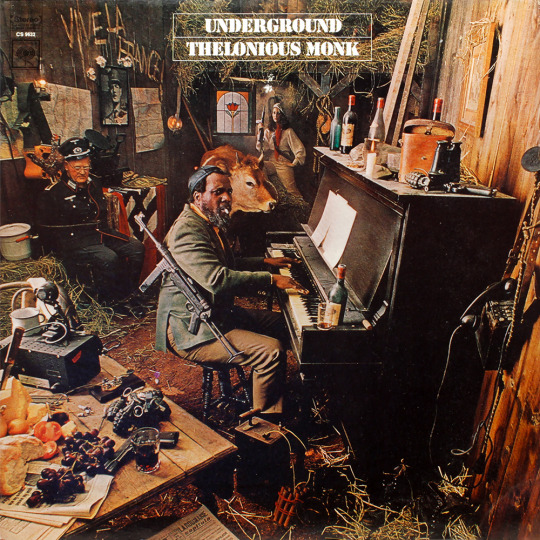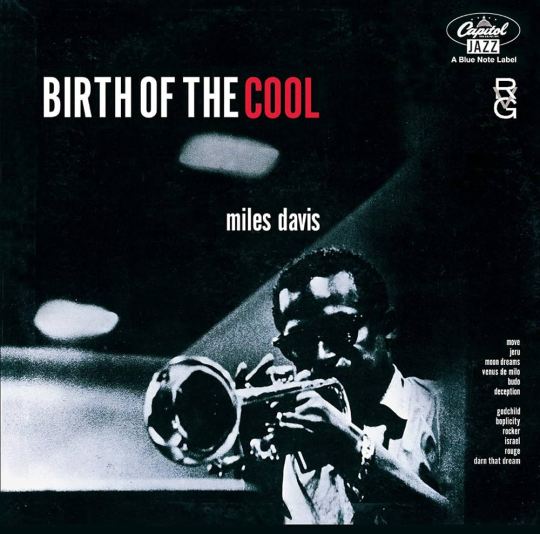#post bop jazz
Text


Both Directions At Once: The Lost Album by John Coltrane, 2018
#both directions at once#lost recordings#lost album#album Diary#john coltrane#jazz#post bop jazz#86%#88% RTR#nature boy#untitled original 11386#villa#impressions#slow blues#one up one down#60's jazz#impulse records#john coltrane's classic quartet
3 notes
·
View notes
Text
‘Brand New Life’ is Brandee Younger’s second album on Impulse! Records. The album blends jazz, funk, R&B and pop and features original compositions and covers of classic songs. Younger’s unique approach to her instrument of choice, the harp, is exemplified in tracks like ‘You’re a Girl for One Man Only’, ‘Livin’ and Lovin’ in My Own Way’ and ‘Dust’.
0 notes
Text

#Post-Bop#Avant-Garde Jazz#Hard Bop#Third Stream#Jazz#Experimental Big Band#1950s#1960s#1970s#USA#poll#Spotify
136 notes
·
View notes
Text
Joe Henderson, 1980

117 notes
·
View notes
Text

E l l a F i t z g e r a l d
#ella fitzgerald#jazz#swing#bebop#traditional pop#blues#soul#doo wop#post bop#rock n roll#melanin#blackgirlmagic
117 notes
·
View notes
Text
jazz is so silly because you could have two recordings of the same song and they only share like one riff that they play 4 times and the rest is a completely different song in a completely different key at a completely different tempo and like. yeah. thats just how songs are.
7 notes
·
View notes
Text

Underground by Thelonious Monk
Columbia
1968
Jazz / Bop / Hard Bop / Post-Bop / Piano Jazz
20 notes
·
View notes
Text

John Coltrane - Crescent.
1964 : Impulse! A 66.
! listen @ Apple Music ★ buy me a coffee !
#jazz#post bop#modal jazz#john coltrane#1964#impulse!#jimmy garrison#elvin jones#mccoy tyner#jazz quartet#rudy van gelder#van gelder studio#1960s#1960s jazz#essential jazz#essential album
11 notes
·
View notes
Text
#13: Miles Davis - Birth of the Cool (1957)
Genre(s): Jazz, Post-Bop, Cool Jazz

Welp, it only took 13 albums for me to screw up and skip an album by mistake. I went back and edited my prior posts to correct the numbering. Birth of the Cool is a pretty embarrassing one to skip too; like all self-respecting jazz listeners, I'm a big Miles fan, and had been looking forward to talking about some of his work (this is far from the last Miles album in 1001 Albums).
Despite being number 13 on the list, these are actually the earliest recordings in the whole book. Ironically, despite now being considered a classic jazz album and typically viewed as a single coherent album, Birth of the Cool is actually a compilation album comprised of 78 sides recorded by the Davis nonet for Columbia between 1949 & 1950 and later reissued together as an LP. This is more common in Miles' discography than you'd expect; many of his later albums were released a few years after the initial recording as his workflow shifted towards recording long sessions with a single band and then producing multiple albums from a few related sessions.
At the time of recording Miles was coming hot off his breakthrough success as part of Charlie Parker's band. These sessions were some of his first recordings as bandleader and established him as a pioneering voice in jazz. The cool jazz sounds on these sessions stand in stark contrast to the fast-paced technical showcases heard on most bebop albums at the time. He'd already made a name for himself as someone concerned with the aesthetics and timbral quality of sound with his unique approach to trumpet playing as part of Bird's band, focusing on playing "straight" with a pure, unembellished sound (this is a stark contrast to trumpet playing at the time, which had a strong Louis Armstrong influence with a highly embellished approach), and the Birth of the Cool sessions cemented it. The arrangement and instrumentation was highly unusual at the time (a nonet with a french horn!) but was crafted with intention to create the specific timbral textures present on the recording. This kind of thinking was mostly unheard of in jazz at the time (and arguably in music at large), with the main focus of most groups being the technical elements of the performance rather than the aesthetic ones. This approach is one of the few consistent elements in Davis' long, storied, strange career. While the aesthetic goal often changed as his sound evolved, the focus was a constant one that I personally believe is largely responsible for consistently setting his music apart from the crowd over the years.
The Birth of the Cool sessions also started to overarching trend of constant change in Miles' career. He was always trying to find the next new thing, and was never satisfied with resting on his laurels. It's as evident here as it would be throughout his career: by the time Birth of the Cool was compiled and released as an LP, Miles had already moved on to innovating hard bop, and was only a few years from pioneering modal jazz with Kind of Blue, which would turn the genre completely on its head once again. Frankly, most artists would have never left the immensely successful and influential sound of Birth of the Cool, but by the time it was released Miles was already honing in on the NEXT next big thing. To me, what's what made Miles different from the majority of his peers and earned him his legendary status today as one of jazz's finest composers and bandleaders. If you follow the careers of the other top jazz players in history you'll see similar trajectories of never being satisfied with stagnancy (artists like John Coltrane, Wayne Shorter, Herbie Hancock, and Sun Ra all come immediately to mind; incidentally 3/4 of those listed had large roles in various iterations of Miles' bands).
Another innovative element here was that the nonet was racially diverse and integrated. I need to remind you, this was in 1949. Brown v Board wouldn't come to pass for another 5 years, and the South was still steeped in segregationist Jim Crow thinking. While things were becoming more integrated in the jazz scene, racial tensions in the US were still high at the time and it was very uncommon to see a mixed group like this, both due to the tensions of the time and due to the challenging logistics of touring with such a group (particularly in the South). Miles always said that he simply picked the best players for the job when selecting band members for a session. In this case, he was heavily inspired by modern classical music and found that many white players played that style more to his liking. You could write a whole essay on the topic of racial politics in jazz at this time and I simply don't have the room in a Tumblr post to give the topic the time it deserves, but I'd be remiss not to put the band and recordings in the context they existed in.
Anyways, it probably goes without saying, but yes you MUST hear Birth of the Cool before you die. It's a spectacular listen, and a highly influential one. Also of note, it's a good starter album if you're just getting into jazz and don't know where to begin (I'd also recommend Kind of Blue, but we'll talk more about that when we get there). It has enormous music depth, but is highly accessible to a non-jazz listener.
For the nerds: I listened to this one in hi-res on Qobuz, purely because I was on a roll at the time and didn't feel like going to the other room and throwing the CD in my main system.
Next time (skipping ahead chronologically, because I fucked up and skipped this album): Jack Takes the Floor, for real this time!
#1001 albums#1001 albums you must hear before you die#1001albumsrated#album review#now spinning#jazz#cool jazz#post-bop#Miles Davis#Birth of the Cool
5 notes
·
View notes
Text

EPIC ALBUM COVER #31
Charles Mingus - The Clown
Released: 1957 (Atlantic)
Post-bop, avant-garde jazz
#epic album cover#music#album cover#album#charles mingus#the clown#post bop#hard bop#spoken word#avant garde jazz#jazz
2 notes
·
View notes
Text

Roland Kirk - I Talk With The Spirits
(1965 album)
Youtube Playlist | Spotify
[Post-Bop, Avant-Garde Jazz]
3 notes
·
View notes
Text
2 notes
·
View notes
Text

Members : Don’t Git Weary.
Max Roach.
5 notes
·
View notes
Text

#Jazz Fusion#Jazz#Post-Bop#ECM Style Jazz#Third Stream#Avant-Garde Jazz#1960s#1970s#1980s#USA#poll#Spotify
86 notes
·
View notes
Text
In the pantheon of jazz trumpeters, FreddieHubbard stands as one of the boldest and most inventive artists of the bop, hard-bop and post-bop eras. Although influenced by titans like MilesDavis and Clifford Brown, Hubbard ultimately forged his own unique sound – a careful balance of bravado and subtlety that fueled more than fifty solo recordings and countless collaborations with some of the most prominent jazz artists of his era. Embedded in his massive body of recorded work is a legacy that will continue to influence trumpeters and other jazz artists for generations to come.
Freddie Hubbard: April 7, 1938 - Dec 29, 2008
source: jazzcorner.com
En el panteón de los trompetistas de jazz, FreddieHubbard figura como uno de los artistas más audaces e inventivos de las épocas bop, hard-bop y post-bop. Aunque influido por titanes como Miles Davis y Clifford Brown, Hubbard acabó forjando su propio sonido, un cuidadoso equilibrio de bravuconería y sutileza que alimentó más de cincuenta grabaciones en solitario e innumerables colaboraciones con algunos de los artistas de jazz más destacados de su época. Su ingente obra discográfica encierra un legado que seguirá influyendo en los trompetistas y otros artistas de jazz durante generaciones.
Freddie Hubbard 7 de abril de 1938 - 29 de diciembre de 2008
11 notes
·
View notes
Text
charles mingus is sooo fucking good. yall go listen to black saint and the sinner lady RIGHT NOW!!!
3 notes
·
View notes